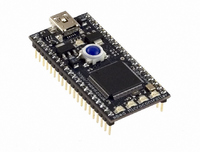OM11043 NXP Semiconductors, OM11043 Datasheet - Page 2

OM11043
Manufacturer Part Number
OM11043
Description
DEVELOPMENT BOARD LPC1768 MBED
Manufacturer
NXP Semiconductors
Series
mbedr
Type
MCUr
Specifications of OM11043
Contents
Board and software
Development Tool Type
Hardware / Software - Eval/Demo Board
Kit Contents
Board Cable Docs
Mcu Supported Families
LPC1000
Tool / Board Applications
General Purpose MCU, MPU, DSP, DSC
Silicon Manufacturer
NXP
Core Architecture
ARM
Core Sub-architecture
Cortex - M3
Silicon Core Number
LPC17xx
Silicon Family Name
LPC17xx
Lead Free Status / RoHS Status
Lead free / RoHS Compliant
For Use With/related Products
LPC1768
Lead Free Status / RoHS Status
Lead free / RoHS Compliant
Other names
568-4916
Available stocks
Company
Part Number
Manufacturer
Quantity
Price
Elegant simplicity
The mbed tool has been designed for the best trade-off
between versatility and immediate connectivity. The LPC1768,
housed in an LQFP package, is mounted on the mbed board,
which uses a 40-pin DIP with a 0.1-inch pitch. The convenient
form factor works seamlessly with solderless breadboards,
stripboards, and PCBs.
There is no software to install – everything, even the compiler,
is online. The compiler and libraries are completely modular, so
they’re easy to use, yet powerful enough to take on complex,
real-world applications.
Pinout diagram of mbed NXP LPC1768 board
Hassle-free startup
Getting started is as simple as using a USB Flash drive.
Simply connect the mbed NXP LPC1768 board to a Windows,
Mac or Linux computer and it will appear as a USB drive.
Follow the link on the board to connect to the mbed website,
where you can sign up and begin designing. There are no
drivers to install or setup programs to run. It’s so easy, in fact,
that you can have a “Hello World!” program running in as little
as five minutes.
Online compiler
The mbed Compiler lets you write programs in C++ and then
compile and download them to run on the mbed NXP LPC1768
microcontroller. There’s no need to run an install or setup
program, since the compiler runs online. Supported browsers
include Internet Explorer, Firefox, Safari, or Chrome running on
a Windows, Mac, or Linux PC. You can log in from anywhere
and simply pick up where you left off. And, since you’re
working with a web-based tool, you can be confident that it’s
already configured and will stay up-to-date.
The compiler uses the ARM RealView compile engine,
so it produces clean, efficient code that can be used
free-of-charge, even in production. Existing ARM application
code and middleware can be ported to the LPC1768
micro controller, and the mbed tools can be used alongside
other professional production-level tools, such as Keil MDK.
The mbed Compiler
Peripheral libraries
The mbed Library provides an API-driven approach to
coding that eliminates much of the low-level work normally
associated with MCU code development. You develop code
using meaningful peripheral abstractions and API calls that are
intuitive and already tested. That frees you up to experiment,
without worrying about the implementation of the MCU core
or its peripherals. You can work faster and be more creative,
and can concentrate on exploring and testing the options for
your design.
Rather than simply providing examples, mbed focuses on
reusable library functionality, with clear interfaces and solid
implementations. The core mbed Library supports the main
LPC1768 peripherals, and the libraries already contributed by
the mbed design community include USB, TCP/IP, and HTTP
support. It’s also possible to add third-party and open-source
stacks.
The libraries comply with the ARM EABI and are built on the
Cortex Microcontroller Software Interface Standard (CMSIS),









